Finding a home to rent in the UK can feel overwhelming. It’s full of legal language and complex steps. This guide makes it easier, giving you the tips you need. Whether you’re new or experienced in renting, this advice is vital. It covers the basics of leasing and how to negotiate. This guide is your key to finding the perfect home.
The Basics of Renting a Property in the United Kingdom
Starting to rent a home in the UK means you need to know the basics well. One key point is understanding the Assured Shorthold Tenancy (AST). This includes knowing your rights and what you need to do. It also means reading rental agreements carefully to avoid problems.
Understanding Assured Shorthold Tenancies (AST)
Assured Shorthold Tenancies are at the heart of private renting in Britain. They let landlords take back their property after a set time. This is usually between six months and three years. Tenants get protection but must follow the agreement’s rules.
Key Legislation Affecting Tenants and Landlords
Laws like The Housing Act protect both tenants and landlords. It’s important to know these laws well. They help make renting fair, keep deposits safe, and make renting smooth for everyone.
Deciphering Your Tenancy Agreement
The tenancy agreement is key to a good rental experience. It shows what you and your landlord have agreed to. Paying attention to this document is very important. It explains your duties, how long you can stay, how much rent is, and more. This helps avoid issues later.
Navigating the UK Rental Market

When hunting for a rental in the UK, timing is key. It greatly affects both the price you’ll pay and what’s available. Knowing when to look can help you find the right place at the right price.
To navigate the rental market well, keeping up with seasonal trends is important. Summer is busy because students and families are moving. But winter might be calmer, offering chances for better deals on rent.
- High demand in cities with big industries or universities can push up rental prices and competition.
- Watching how economic factors and housing policies change rental prices is wise. This helps in getting a good deal.
- Local happenings, regeneration projects, and new transport links can make some areas more appealing, affecting rentals.
Bearing these factors in mind is crucial when looking for the perfect rental home. A timely search, informed by the latest market trends, not only boosts your chances of finding a great place. It also positions you to negotiate better terms, reflecting the current market scenario.
Finding the Perfect Rental Property
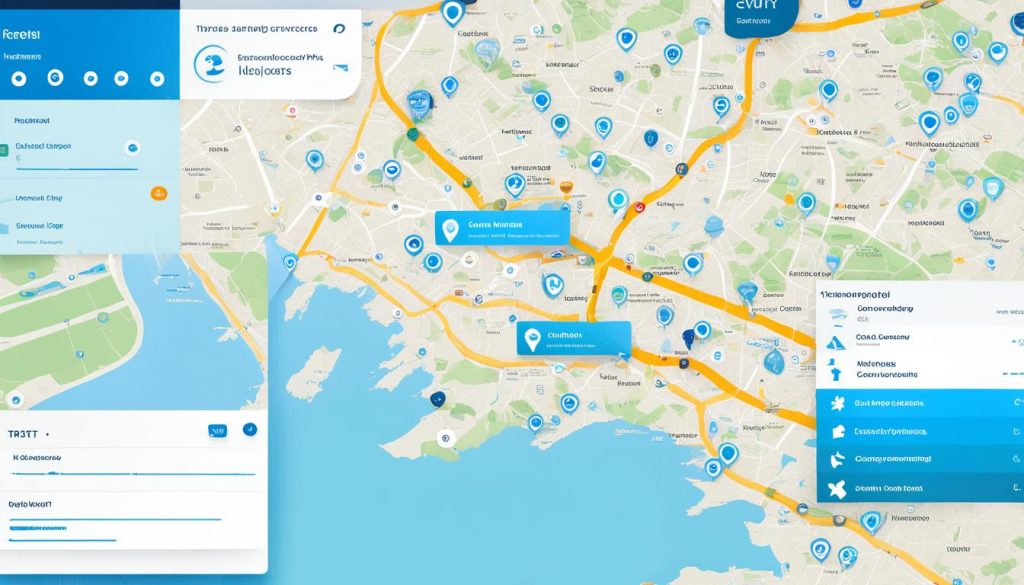
Looking for a new place to live in the UK is thrilling. You might be moving for work, study, or a fresh start. Knowing how to search online, the role of letting agencies, and what makes a good location and amenities is key. These tips will help you find the perfect home with less stress.
Searching for Properties Online
Nowadays, searching online is essential for finding a rental. There are many websites with listings to browse. You can use filters to narrow down your search by location, budget, and more. Make sure to use trusted sites and set up alerts to stay updated on new listings.
Utilising Letting Agencies
UK letting agencies are a big help when looking for a place. They have listings not always seen by the public and can guide you through renting. They help with tenancy agreements and viewings. Choose an agency that’s registered with a recognized body for professional service.
Assessing the Location and Amenities
Think about what you need in a location. Consider how close it is to work, schools, transport, and shops. These aspects greatly affect how happy you’ll be there. Here’s what to keep in mind:
- Travel links and commute times
- Access to essential amenities like shops, gyms, and medical centres
- Quality of local schools for those with children
- The area’s safety and sense of community
It’s not just the property, but its location and nearby facilities that make a place feel like home. With these insights, and the help of online resources and letting agencies, you’re set to find a great home that suits your needs.
Viewing Properties and What to Look For
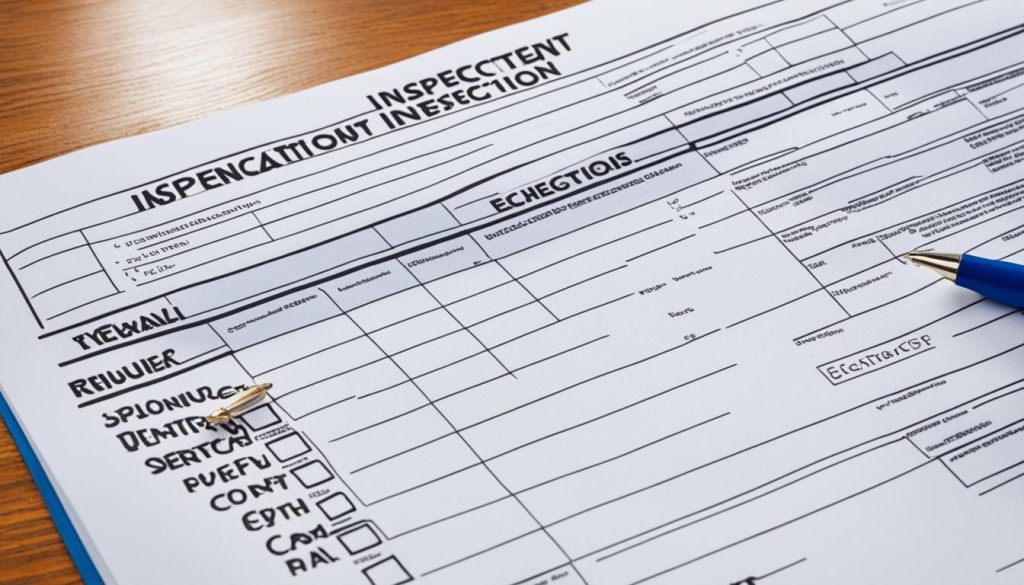
Looking at rental properties is exciting but can also be overwhelming. Don’t worry, though. A detailed checklist and helpful tips can make it easier. This guide offers expert advice for those looking to rent. It helps ensure you don’t miss anything important when inspecting properties.
When looking at rentals, pay close attention to each one. Check the property’s condition, location, and if it has what you need. Here’s a brief guide to help you carefully look at each point:
- Inspect the property’s condition; check for damp, mould, and overall structure.
- Make sure all faucets, showers, and toilets have strong water flow and drain well.
- Ensure windows, doors, locks, and alarms are secure and working.
- Look at the electrical outlets and appliances to see they’re safe.
- Check the heating system and ask to see the last service record.
Don’t rush your inspection. Take your time to look around each room. Imagine placing your things there. Think about any changes or repairs needed. Here are more tips for a thorough property check:
- Visit at various times to check natural light and what the area feels like.
- Ask about the costs of utilities, council tax, and any other charges.
- Talking to neighbours can give you insight into the community.
Ask important questions during your visit. Ask the landlord or agent about insulation, energy ratings, maintenance plans, and repair requests. This shows you’re serious and helps you gather essential information.
In summary, finding a rental is about finding a home. By focusing on a thorough inspection and following these tips, you’re more likely to find a peaceful place to live.
Understanding Rental Fees and Budgeting
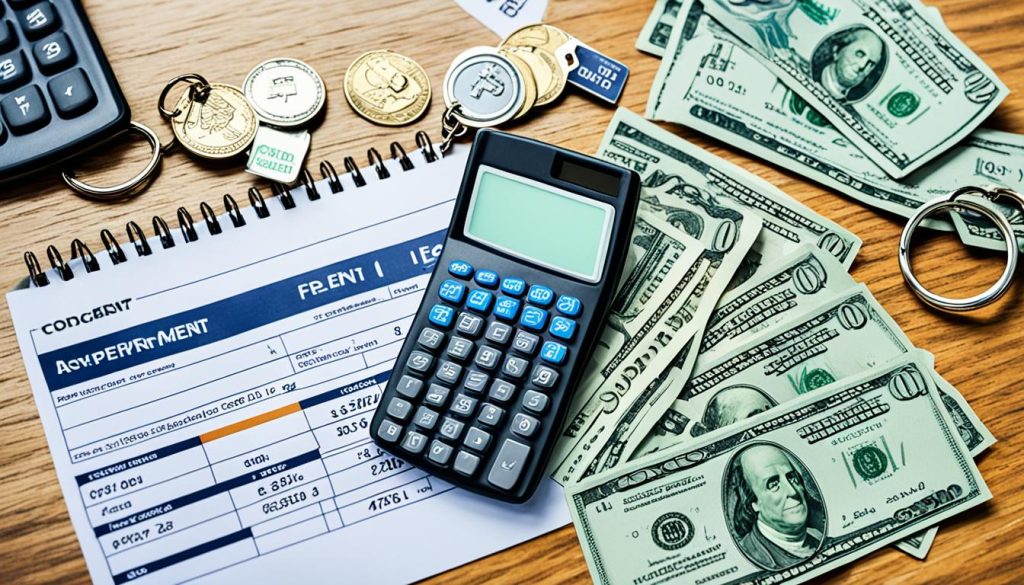
When you start renting, knowing the costs is key. You’ll pay each month, but there’s more to think about. Making a smart budget for rent helps you live well without spending too much.
Initial Costs: Deposits and Advance Rent
Before moving in, there are upfront costs. You’ll need to pay a tenancy deposit and the first month’s rent. The deposit is for the landlord in case of damages or unpaid rent. Paying these first costs is a big part of your moving budget.
- Assess the deposit requirements – typically no more than five weeks’ rent.
- Prepare to pay the first month’s rent upfront alongside the deposit.
Monthly Rent and Hidden Fees
The monthly rent can change, so make sure it’s affordable. Watch out for hidden fees. Thanks to new laws, many extra costs are gone. But, check if you need to pay for utilities, council tax, or other services.
- Confirm what your monthly rent payment covers.
- Allocate funds for any additional service charges.
Planning Your Budget for Additional Living Expenses
There are other costs besides rent. Think about food, travel, internet, and fun activities. These are all key for a good living budget. Make a detailed budget that includes these to rent without worry.
- Estimate routine living expenses to maintain a balanced budget.
- Set aside savings for unplanned expenditures that may arise.
Learning about renting costs and making a budget helps avoid money problems. A good budget means a happier time in your new home. It’s your best tool for a worry-free stay.
Tenant’s Rights and Responsibilities
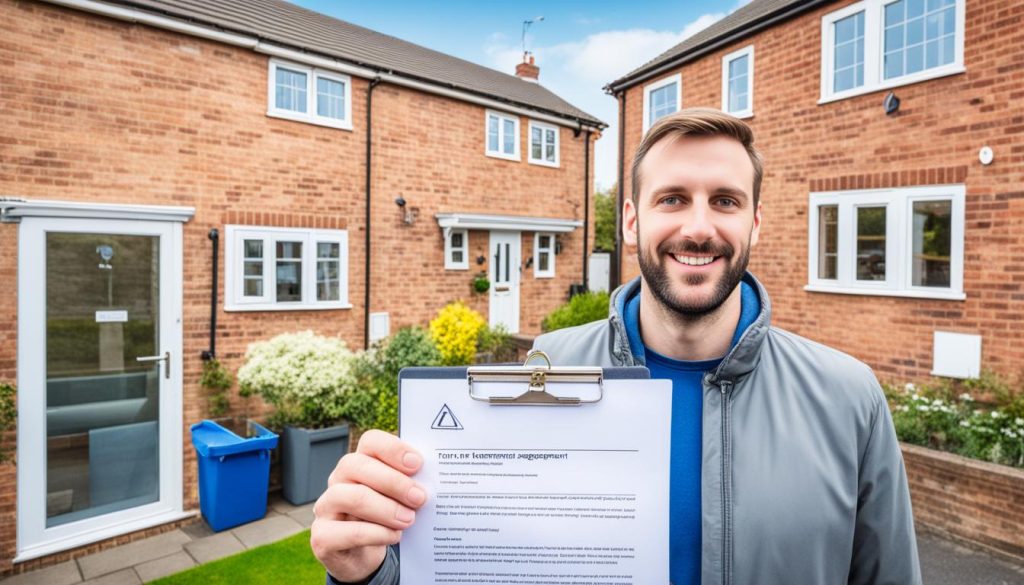
Knowing about tenants’ rights in the UK is crucial for anyone about to rent. It’s also important to understand your tenant responsibilities for a smooth stay. We’ll outline the key rights and duties for renters in the United Kingdom.
- Right to a safe and habitable living environment: Tenants are entitled to live in a property that is safe and well-maintained.
- Right to be informed: Landlords must provide clear and concise information about tenancy terms and any changes to the contract.
- Right to privacy and quiet enjoyment: Tenants have the right to live undisturbed and landlords must request access to the property.
Tenants also have key responsibilities to maintain:
- Prompt payment of rent: Tenants must keep up with rent payments as agreed in the tenancy agreement.
- Care of the property: Tenants should treat the property with respect, keeping it in a good state of repair aside from normal wear and tear.
- Respecting terms of the lease: Tenants are expected to abide by all other terms outlined within their rental agreement.
Keeping a balance between rights and duties is important for a good landlord-tenant relationship. For more information on tenancy issues, seek advice from legal experts or governing bodies.
Deposits and Tenancy Deposit Protection Schemes

It’s vital for both landlords and tenants in the UK to understand tenancy deposits. Laws make sure that deposits are protected as part of the rental deal. This helps keep funds safe and offers a way to sort any deposit disagreements.
What is a Tenancy Deposit?
A tenancy deposit is money held by the landlord as a safety net during a lease. It’s there to cover any damages or unpaid rent when the tenancy ends. Legally, this money must be put into a protection scheme. This guarantees tenants get their deposit back if they stick to the agreement, look after the property, and pay their rent.
How Tenancy Deposit Protection Works in the UK
- The landlord must put the deposit in an approved scheme within 30 days of getting it.
- There are custodial and insurance options for deposit protection, based on what the landlord prefers.
- Landlords then need to give tenants details about the deposit protection, including how to get the deposit back.
Dispute Resolution and Getting Your Deposit Back
If there’s no dispute at the end of a tenancy, getting your deposit back is simple. But if there’s a claim for damages or unpaid rent, deposit protection helps solve the issue. Deposit schemes have a free service that lets an impartial person decide based on evidence from both sides.
- To get their deposit back, tenants need to ask the protection scheme at the end of their lease.
- If the tenant and landlord can’t agree on deductions, the scheme keeps the deposit safe until a decision is made.
- This ensures a fair outcome, considering both tenant and landlord interests.
The system for protecting and returning tenancy deposits, including solving any disputes, aims to offer security. It treats everyone fairly and keeps the money ready for rightful claims at the end of a lease.
Negotiating with Landlords and Letting Agents

Learning how to negotiate is key when you’re looking to rent. It’s important for discussing both rent and tenancy terms. Talking to landlords or dealing with letting agents requires a good strategy. This can help get a deal that matches your financial needs and living situation.
To bargain effectively, be ready and communicate clearly. First, study the rental market in the area to know average rent prices. This will help when you suggest what rent you want to pay.
- Point out your strengths as a tenant, like having a steady income, a good credit score, or references.
- Be honest about how much you can afford and the tenancy terms that matter to you.
- Talk about how long you plan to stay and if rent could be adjusted later. Think about staying longer.
- Be open to making some trade-offs, such as taking a longer lease for lower rent.
When you talk to letting agents, remember they act for the landlord but also want to let the property quickly. Being friendly and working together can help. Appear reliable and willing to work together for smoother talks. It’s good to stay professional and cooperative.
- Think about what you’re willing to give up and use it to negotiate.
- Expect them to suggest different terms; finding common ground can help reach an agreement.
- Make sure any verbal agreements are written down to confirm the deal.
- If needed, you might get a professional negotiator or solicitor in tenancy law to help.
Talking terms involves compromise as well as stating your needs. Being prepared and knowledgeable leads to an agreement good for both sides. Always be polite and professional with landlords or agents. This sets a good foundation for your relationship with them.
Moving Into Your New Rental Home
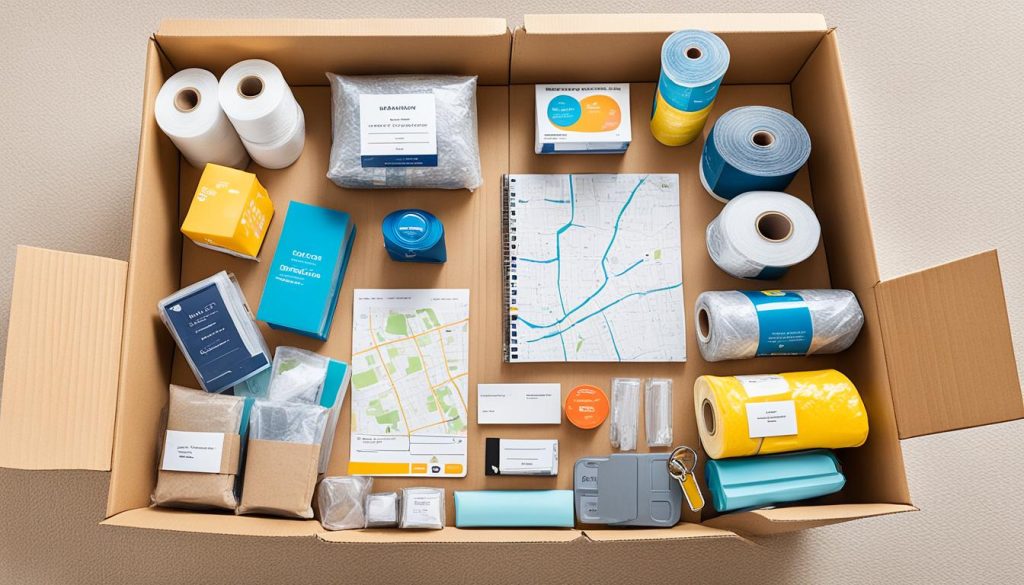
Moving to a new place is thrilling and a bit stressful. A checklist for moving day can help ease the stress. Setting up utilities beforehand and doing rental inventory checks are key. These steps make starting off in your new home easier and more comfortable.
Checklist for Moving Day
Having a moving day checklist is very helpful. It should include:
- Finishing packing your things
- Clearly labeling boxes with their contents and intended room
- Preparing a box of essentials for the first night like toiletries and bedding
- Confirming plans with your removal company or van rental
- Checking how the moving vehicle will access and park
- Doing a final walk-through to make sure you’ve taken everything
Setting Up Utilities and Services
Setting up utilities is a top priority before you arrive. You need to:
- Call utility providers to start accounts for electricity, gas, and water
- Make sure your internet and phone lines are active
- Update your address for services and subscriptions
- Register for council tax
Understanding the Inventory Check
Rental inventory checks protect your deposit. On the day you move:
- Go through the inventory inspection with the landlord or agent
- Note and photograph any damage or wear and tear
- Check what the inventory includes, like furniture and utensils
- Record meter readings to ensure you’re not charged for previous use
- Make sure you get a copy of the inventory report
These steps will make moving into rental living smoother. They help prevent disputes and give you peace of mind as you begin your new chapter.
Maintaining a Good Tenant-Landlord Relationship

Keeping a strong tenant-landlord relationship is key to a successful tenancy. Open and respectful communication between tenants and landlords builds trust and cooperation. This section explores ways to keep a good relationship and follow the best practices for renting.
Good communication is more than just regular updates. It means being clear and understanding the other person’s situation. Here are useful tips for tenants and landlords:
- Always communicate in writing to keep a record of your talks.
- Be quick to mention any issues with the property. This stops small problems from getting bigger.
- Work together to solve disputes, showing you’re willing to find a solution that works for both.
Other actions can also strengthen the tenant-landlord relationship:
- Paying rent on time proves a tenant’s dedication to the agreement.
- Landlords should fix maintenance problems quickly. It shows they care about the tenant’s comfort and safety.
- Both sides should respect each other’s privacy and rights, like the tenant’s right to quiet and the landlord’s right to manage their property.
In conclusion, a good rental relationship is based on respect, quick action on concerns, and sticking to rental rules. By having positive interactions, landlords and tenants can have a easier, more pleasant renting experience.
Managing Rental Issues and Repairs
Living in a rented property means some things may need fixing over time. It could be general upkeep or an urgent repair. Knowing the difference between what tenants and landlords should fix is crucial. It helps fix issues quickly and efficiently. Tenants need to know how to report problems, especially in emergencies.
Reporting Problems and Requesting Repairs
Good communication is key to handling rental maintenance. Tenants must tell their landlords about any problems right away. This often involves sending an email or using an online portal. This way, there’s a record of all messages. For regular repairs, landlords have a certain amount of time to fix things.
- Leaking taps or pipes
- Heating system malfunctions
- Electrical issues not posing immediate danger
What to Do in an Emergency
If there’s an emergency that could harm people or the property, like a gas leak, act fast. Tenants should tell their landlord or emergency contact straight away. In dangerous situations, it’s also smart to call emergency services or utilities. This helps prevent more damage or danger.
- Shut off the main power or water supply if safe to do so.
- Evacuate the premises if required.
- Follow the provided emergency procedures in your tenancy agreement.
Landlord Responsibilities vs. Tenant Duties
Landlords mainly handle the big repairs and upkeep of the property’s structure and essential systems. Tenants should do small maintenance tasks, like changing light bulbs and keeping the garden tidy. They should also keep the place in good shape.
- Landlord’s responsibilities include major installations and structural upkeep.
- Tenant’s duties cover everyday minor maintenance and reporting bigger concerns.
The tenancy agreement usually clearly states who is responsible for what. It’s vital for both landlords and tenants to know this. It ensures that everyone knows what they should do.
Renewing Your Lease and Rent Increases
When your tenancy is almost over, you face important choices. Deciding whether to stay or move is a big decision. If you’re thinking about renewing your tenancy, knowing the details of the lease extension is crucial. It’s also important to know how to deal with rent increases to keep your living situation and budget on track.
Before starting the tenancy renewal, think about possible changes, like rent going up. Landlords can ask for more rent, but you can also negotiate.
- Look over your lease to see what it says about renewing and changing the rent. These agreements usually explain how renewal and rent changes work.
- Talk to your landlord early. Share your wish to stay longer and your thoughts on rent increases. Being open and respectful helps in reaching a fair agreement.
- Find information on similar rental places. If your landlord wants more rent, show them proof. This can show if the rent they want is too high compared to others.
- Think about how the new rent fits with your budget. Rent often goes up over time. But increases should still be affordable for you.
- Think about how long you want to extend your lease for. A longer lease means more stability but less freedom. A shorter lease gives flexibility but less certainty.
Make sure any changes you agree on are put into writing. You and your landlord should sign something new or add to your lease. This matters for legal reasons and keeps everything clear for both of you.
Knowing how to handle rent increases can help both tenants and landlords find a good solution. Renewing a tenancy is not just about staying longer. It’s about making sure your home stays enjoyable and affordable.
Planning for the End of Your Tenancy
As your tenancy is coming to an end, you’ll need to take some important steps. These help ensure you move out smoothly. They include knowing when to give notice, doing a final cleaning, and getting your deposit back. Being ready for these steps helps avoid problems.
Notice Periods and Moving Out
In the UK, ending your tenancy means you must follow certain rules about when to tell your landlord you’re leaving. These rules are in your rental agreement. You’ll usually need to tell them at least a month before. It’s vital to do this right to avoid extra costs.
End-of-Tenancy Cleaning and Property Condition
Cleaning well when you move out is essential. You have to leave the place as good as when you arrived. You might want to get professionals to clean. This ensures you meet your landlord’s standards and helps get your full deposit back.
Final Rent Payments and Deposit Returns
It’s very important to pay your last rent on time. Once you’ve moved out and cleaned up, you’ll want your deposit back. Learn how the deposit return process works. This process is often handled by a special deposit scheme. It lets you get your money back quickly and argue against any unfair charges.
- Check your tenancy agreement for the required notice period and provide written notice accordingly.
- Plan and execute move-out cleaning to restore the property to its initial condition.
- Rectify any damage caused during the tenancy to ensure the full deposit can be reclaimed.
Understanding the Rights of Tenants in Shared Accommodations
Living in shared homes means knowing your rights and duties. In these homes, rights are shared among everyone. This is different from living alone where one person has all rights. Understanding both group and personal rights is key in shared living.
- Individual vs. Collective Agreements: Often, tenants in multiple occupancy homes will sign a joint tenancy agreement, which means that all tenants have equal shared housing rights and responsibilities. Alternatively, some may have individual agreements which protect their rights on an individual basis.
- Rights to Common Areas: Shared tenancies grant tenants rights to use common areas such as the kitchen, bathroom, living room, and any other shared spaces. It’s important that these areas are respected and maintained by all occupants.
- Shared Responsibilities: Residents in shared accommodations must understand their collective responsibilities, particularly when it comes to paying rent and bills or managing noise levels to ensure a harmonious living environment.
In homes with multiple people, it’s vital to know your rights and think about others’. Good respect and talking are crucial. They help everyone get along well in shared living.
Conclusion
The UK rental market can seem tricky, but this guide has given you the tools to master it. Knowing your rights and duties makes renting in the UK a smoother process. We’ve covered how to carefully choose a property, plan your finances, and talk to landlords and letting agents.
To protect your deposit, use tenancy deposit schemes. It’s also key to have a good relationship with your landlord. Know what to do if there are problems or repairs needed. Being aware of your lease details and rights helps make every part of renting clear.
In wrapping up, the main advice is to stay informed, communicate well, and plan ahead. This will protect your interests. With careful attention and knowledge, you can find a great place to rent. May you find not just a house, but a home.
















